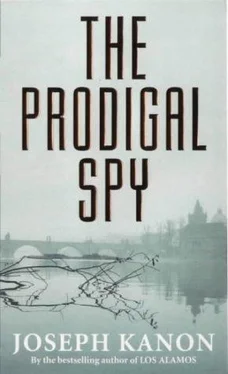“Mom?” he said, looking into her frightened eyes. “Don’t tell anyone else.”
By the next day his father was no longer unavailable for comment: he was missing. There were more men outside, and Nick saw that one was now watching the back too. Nora moved into the guest room, bringing her things over in a small valise, settling in for a siege. The radio said his father had been distraught at the news of the Cochrane suicide, but how did they know? Mr Benjamin came, and Uncle Larry, and the police again, two men from the FBI. The phone rang.
Each day that week, as the spill spread, the headlines grew larger, so that the mystery itself became the news, begging for an answer. Welles appealed to his father to come out of hiding, implying that he had become guilty simply by being absent. Still, there was a new hesitancy in his voice, as if, having pushed one victim to a desperate act, he did not want to be blamed for another. Walter Kotlar had eluded him after all. There was an article about the rot in the State Department, the pumpkin field again, the China lobby, the unaccountable disappearance, proof of some larger conspiracy. But the story refused to stay political. The mystery seemed too complete for that-it frightened people. Nobody ran away from a hearing. It seemed to belong instead to the tabloid world of personal scandal and WANTED posters and cars speeding away in the night, a more familiar fall from grace. Was he still alive, sitting in some hotel room with his own open window? One day the papers ran some old family pictures. Nick and his mother, she squatting next to him proudly on the pavement as he showed off his new suit to the camera. His father as a young man, smiling. The house on 2nd Street. The car, still parked in the garage. All the pictures of a crime story, without any crime.
All week, as the newspapers grew louder and louder until finally, like a fire out of oxygen, they choked and went out, what struck Nick was the quiet in the house. With all the phones and visitors and black headlines that seemed to carry their own sounds, hours went by when there was nothing to hear but the clock. People spoke in low voices, when they spoke at all, and even Nora walked softly, not wanting to disturb the patient.
His mother was the patient. She spent long stretches sitting on the couch, smoking, not saying a word. Her silence, her intense concentration on nothing at all, frightened him. At night, alone, she drank until finally, her eyes drooping, she would curl up on the couch, avoiding her bedroom, and Nick would wait until he heard her steady breathing before he tiptoed over and covered her with the afghan. In the morning, she never wondered where it had come from. She seemed to forget everything, even what had really happened. She told the police-a relief- that his father had left Sunday morning, just as Nick had said. Yes, they’d played Scrabble. No, he hadn’t seemed upset. When Uncle Larry suggested she get away for a few days until things died down, she said to him in genuine surprise, “I can’t, Larry. I have to be here, if he calls.” The secret, at least, was safe. She had begun living in Nick’s story.
“Are you all right for money?” Larry said.
“I don’t know. Walter took care of all that.”
“You have to know, Livia. Shall I go through his things? Would you mind?”
She shrugged. “It’s all in the desk. At least I suppose it is. The FBI went through it yesterday. I don’t think they took anything away.”
“You shouldn’t let them do that, Livia,” Larry said, a lawyer. “Not without a warrant.”
“What’s the difference, Larry? We don’t have anything to hide,” his mother said, and meant it.
The FBI came often now. In an unexpected seesaw of attention, as the newspapers grew bored with the story, the FBI became more interested. They went through his father’s papers, opened the wall safe, asked the same questions, and then went away, as much in the dark as before. His father had signed a power of attorney for her on Saturday, which seemed suspicious, but his mother didn’t know anything about it. And what, anyway, did they suspect? In the quiet study, everything was in order.
Nick grew quiet too. He wanted to go over things with his mother, plan what to do, but she didn’t want to talk, so he sat listening to the sounds of the house. He thought of everything that had happened, every detail, studying the Cochrane photograph to jolt him into some idea for action, but nothing came back but the creak of floorboards, a windowpane shaking back at the wind, until it seemed that the house was giving up too, disintegrating with them. He read the Hardy Boys books he had got for Christmas, with their speedboats and roadsters and mysteries that were always solved. They rescued their father in one, wily and resourceful. One day, after the snow melted, he walked down A Street to check on the drain, but the shirt was gone, and he barely paused at the corner before turning back.
It was his decision to go back to school, stifled finally by the airless house. When he opened the door that Monday, the reporters swarmed around, expecting his mother, then backed away to let him pass, like the water of the Red Sea. “Hi, Nick,” one of the regulars said, and he gave a shy wave, but they let him alone. At school, the lads backed away too, nodding with sidelong glances, deferential to his notoriety. His teacher pretended he’d been out sick and apologetically piled him with back homework. She never called on him in class. He sat quietly, taking notes, then went home and worked all evening while his mother sat smoking, still drifting. He finished all the make-up work in three days, turning in assignments that were neater and more complete than before, because now it was important to be good, to be blameless.
In the weeks that followed, nothing changed at home, but outside the reporters dwindled and at school people began to forget that anything had happened. When Welles suspended the hearings, the papers barely noticed. As Uncle Larry had predicted, things moved on. And it was Larry who brought his mother back.
“You can’t just sit in the house. I’m taking you to New York for the weekend.”
“To do what?”
“Go to a show, go out to dinner. Get dressed up and show your pretty face all over town,” he said, winking at Nick, Van Johnson again, cheerful and take-charge.
“I can’t.”
“Yes, you can. Livia, you can’t sit here. You’ve got to get on with things.”
“By going to New York with you?”
Larry looked at her and smiled. “For a start. We’ll take the train. I’ll pick you up here at five. Five, no later. And no buts,” he said, waving his forefinger.
Surprisingly, she went. Nora stayed the weekend and she and Nick went to the movies, treating themselves to tea at the Willard. In the long lobby of red carpets and potted palms, no one noticed them. On Sunday, when they went to meet his mother at Union Station, he glanced at the telephone booth, then averted his eyes, as if he were being watched. But his mother seemed better, the quiet around her beginning to thaw, like the melting snow.
It was only at night that it came back, the dread. It was the not knowing. Everyone acted as if his father were dead, but Nick knew he wasn’t. He was somewhere. Nick lay under the covers watching the tree branch and tried to play the cabin game. Over the years, they’d thought of a lot of places where the wind was blowing-the cabin in the mountains, a tent in the desert, that big hotel at the Grand Canyon where they’d gone one summer-but Nick couldn’t picture any of them. Instead there was the committee room, Welles glowering and accusing. A body falling in the cold. The strange walk to the telephone booth. And then, always, the back courtyard filling with snow.
Читать дальше












